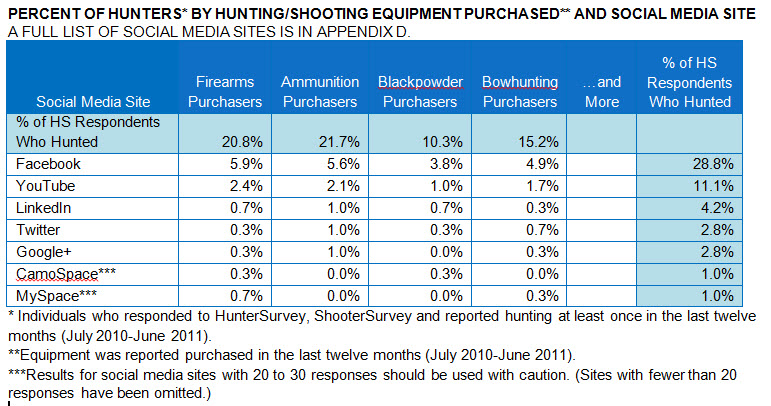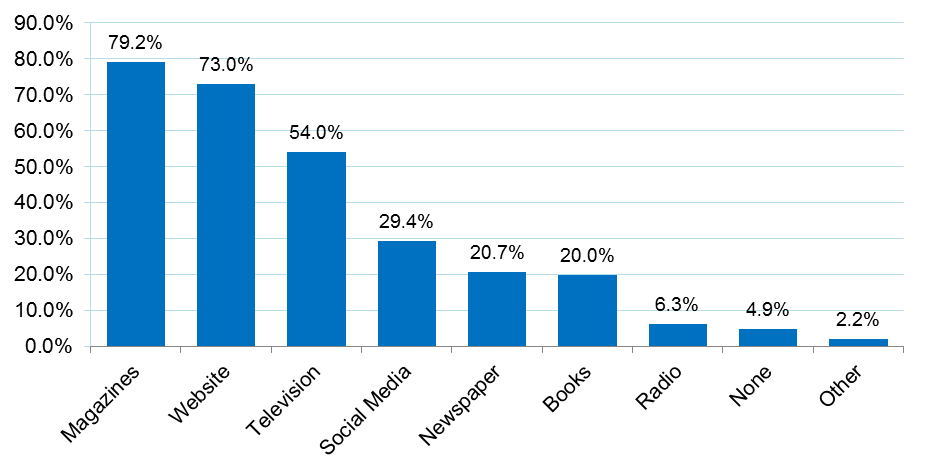Welcome to the Southwick Associates November 2011 newsletter focusing on the economics, business and statistics of fish and wildlife and their associated outdoor recreation.
In This Issue:
- Conservation, Recreation and Preservation Generate an Impressive $1 Trillion Per Year for U.S. Economy
- Southwick Associates Media Monitor Provides Answers to the Most Elusive Social Media Marketing Questions
- Just One Extra Day of Hunting – The Economic Benefits of Adding Sunday Hunting in Pennsylvania
- One Reason to Look Forward to 2012! Results from the National Survey of Fishing, Hunting and Wildlife-Associated Recreation Will Provide New and Better Data
Conservation, Recreation and Preservation Generate an Impressive $1 Trillion per Year for U.S. Economy
A new report, authored by Southwick Associates and commissioned by the National Fish & Wildlife Foundation (NFWF), reveals that officials looking for cost-effective ways to stimulate the economy should look no further than out their own windows: the great outdoors and historic preservation generate a conservative estimate of more than $1 trillion in total economic activity and support 9.4 million jobs each year.
“As a former Secretary of the Interior, governor, senator, and mayor, I have witnessed firsthand how historic preservation, conservation and outdoor recreation result in tremendous benefits to our nation’s economy,” said Dirk Kempthorne. “This study is a valuable tool for reaffirming and quantifying those benefits.”
The report is packed with information. Highlights include:
- In 2006, according to the Outdoor Foundation, the total contribution from outdoor sports in the United States was nearly $730 billion per year, generating more than 6.4 million jobs and $99 billion in federal and state tax revenues. This includes hunting, fishing, wildlife viewing, hiking, camping, snow sports, paddle sports and bicycling.
- In 2006, the combined spending effect of hunting, fishing and wildlife watching associated with National Forest Service land totaled $9.5 billion in annual retail sales, supported 189,400 jobs and provided $1.01 billion in annual federal tax revenues.
- Every million dollars invested in residential historic rehabilitation generates approximately 36 jobs, $1.24 million in income and nearly $200,000 in state and local taxes.
- In 2010, 15 million visitors to Civil War battlefields managed by the National Park Service in just five states (Missouri, Pennsylvania, South Carolina, Tennessee and Virginia) generated 7,700 jobs.
“It is important to note that, unlike many studies released in recent days that attempt to project future jobs to be created by yet-to-be enacted legislation, the jobs and benefits we report currently exist. Any jobs associated with future conservation investments would be over and above the figures reported here,” reported Rob Southwick, President of Southwick Associates, who authored the study.
“Natural resource conservation and historic preservation programs provide hundreds of thousands of jobs and strong returns on public investments that primarily help rural communities and cannot be exported abroad,” said John L. Nau III, chairman emeritus of the Civil War Trust and co-chair of the AVCRP. “This country needs jobs that leverage private investment and conserve our precious natural resources and historic spaces.”
Readers can access the report on the National Fish and Wildlife Foundation’s website. If you would like to discuss details of the study and its implications, contact Rob Southwick at rob@southwickassociates.com.
Southwick Associates Media Monitor Provides Answers to the Most Elusive Social Media Marketing Questions
Manufacturers and media companies have a new tool to help shed light on sportsmen’s media usage and the purchasing habits of various media audiences. Southwick Associates launched the Southwick Associates Media Monitor (SAMM) in 2011 to:
- Help manufacturers & retailers make better decisions about where to invest ad dollars;
- Assist media companies in identifying each property’s strengths and audience interests and to monitor competing media properties; and
- Explain the cross-over between traditional and new media.
Based on requests from various companies in recent years, the Media Monitor was launched to track sportsmen’s use of television, print, web and social media. Below are just a few examples of the types of information reported by SAMM:
Social Media Results:
Media Preferences for U.S. Anglers: 2nd Quarter 2011 Only
SAMM can also rate media properties by their audience’s:
- preferred hunting, shooting and fishing-related brands,
- types of retailers shopped,
- price points, and more.
If you are interested in utilizing SAMM to compliment your efforts, you can obtain results or discuss customized research by contacting Courtney Olson at Courtney@c2csalesandmarketing.com or 303-955-2194.
Just One Extra Day of Hunting – The Economic Benefits of Adding Sunday Hunting in Pennsylvania
As one of the few states not allowing hunting on Sundays, the state of Pennsylvania is currently debating if Sundays should be open to hunters and if so, under which conditions. Many reasons are argued including tradition, family recreation benefits, and economics.
Hunting is a deep-rooted tradition in Pennsylvania. Each year, 950,000 licensed hunters take to the field and woods, nearly three times the number of people who live within the Pittsburgh city limits. One of 14 state residents holds a hunting license. Each hunter on average spends $1,800 annually on gear, trip expenditures and preparations. With nearly 1 million hunters, this adds up to $1.7 billion in retail each year for the state economy. Considering the multiplier effects as these dollars exchange hands, Pennsylvania enjoys 27,500 jobs and $210 million in state and local tax revenues courtesy of resident and non-resident hunters.
A 2005 survey by Southwick Associates showed 43 percent of Pennsylvania’s hunting takes place on Saturdays. In the same survey, Pennsylvania hunters reported they would hunt 27 percent more days if Sundays were available.
This summer, Southwick Associates updated the estimate of Sunday hunting’s economic potential. If Sunday hunting was allowed in the 2010-11 season, Pennsylvania would have enjoyed:
- 7,400 additional jobs, and
- $57 million more in state and local tax revenues
While some of these impacts may occur if hunters engage in other activities on Sundays, the state will still experience a gain. Considering the top competitor to hunting is watching TV, according to soon-to-be released NSSF research, the economic impact created by the dollars associated with watching football or NASCAR on Sundays will be lower compared to dollars associated with a day of hunting. The opening of Sundays is also expected to encourage more residents to hunt who otherwise are obligated elsewhere on Saturdays, and to encourage current resident and non-resident hunters to spend their weekends pursuing game in-state rather than in neighboring states who offer the additional day. Even if Sunday hunting was only permitted during the two Sundays of the general firearm season for deer, 3,300 jobs are expected, along with the $23 million in additional tax revenues. Just like any business, providing greater opportunities to customers to enjoy a product will create more sales and greater economic impacts. Pennsylvania now has the opportunity to serve its hunting community and the state economy.
One Reason to Look Forward to 2012 — New Results from the National Survey of Fishing, Hunting and Wildlife-Associated Recreation Will Provide New and Better Data
Every five years since 1955 the U.S. Fish and Wildlife Service (USFWS), in partnership with state natural resource agencies, has conducted the National Survey of Fishing, Hunting and Wildlife-Associated Recreation. The results provide the data needed to quantify the economic impact of wildlife-based recreation, and is considered to be the most important source of data on fish and wildlife recreation in the United States. Federal, state non-profit and private organizations rely on the Survey to manage fish and wildlife, develop marketing and communications plans and analyze trends.
Southwick Associates in gearing up for the release of the 2011 Survey and is ready to conduct additional analyses upon its release. As done with every survey since the 1985 survey, Southwick Associates will produce economic impact reports for hunting, fishing and wildlife viewing for the nation as a whole and for individual state resource agencies. The data is expected in mid-2012, with the initial economic impacts to be released later in the year. States interested in custom, detailed economic impact reports are encouraged to contact Southwick Associates for details (rob@southwickassociates.com).
In Future Issues:
- Licensing trends and changes
- What is taking away our sportsmen and women? Hunting & fishing’s competition
- The importance of staying in contact with hunters and anglers year-round
- Lessons from 2011 angler & hunter recruitment efforts
Southwick Associates, Inc. specializes in natural resource & environmental economic, business and statistical research. Our staff is comprised of economic, business and statistics professionals throughout the U.S. who have in-depth experience measuring the values, benefits and revenues possible from fish, wildlife, and water-related natural resources plus their associated industries. We can help clients better address many business, legal, legislative and public communication issues through the practical application of reliable and accurate economic information and statistics.
For information and other reports, visit our Web site at www.southwickassociates.com
If you wish to be removed from our distribution list, please send an email with “remove from newsletter” added in the subject line, to donna@southwickassociates.com.
Newsletter Editor, Jodi Valenta, Mile Creek Communications, LLC, Stevenson, CT


